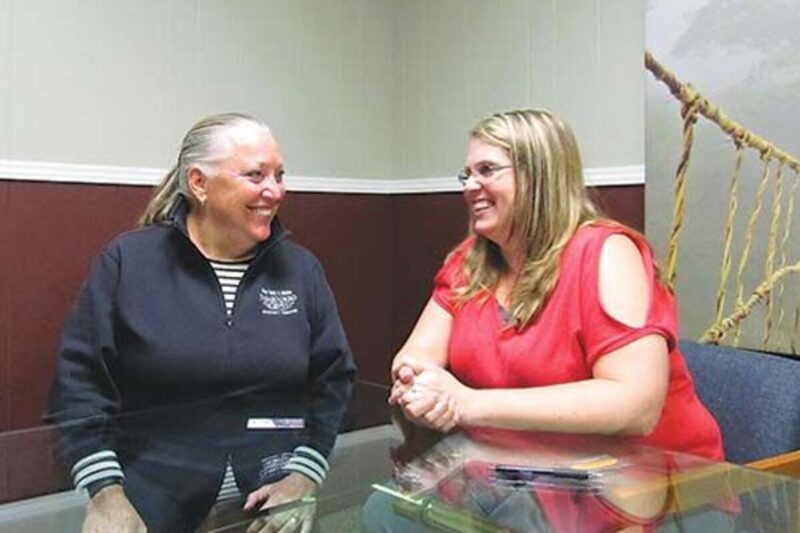Audrey Caro
A desire to help children in the foster care system is the first requirement to become a Court Appointed Special Advocate.
CASAs, as they are known, are volunteers who donate their time to act as independent eyes and ears of the court and advocate for foster children in the custody of the state Department of Human Services.
Jo Ann McQueary has been involved with CASA of Linn County for about 10 years, five of those as a CASA.
She’s a retired kindergarten teacher who spent about 15 years working in the criminal justice system with victims of crime.
According to the CASA of Linn County website, the average time commitment is about 10 hours a month.
The time spent on each case depends on the complexity of the case though.
“This summer I was in court every other week,” McQueary said.
A CASA reads discovery in his or her assigned case and makes recommendations to the judge that are meant to be in the best interest of the child.
While some volunteers have experience in advocacy others are new to the experience.
CASA of Linn County provides training for the legal and welfare systems CASAs need to navigate to do the job.
“I think a lot of people are scared of the court,” said Kitsey Trewin, who has been a CASA for almost two years. “The judges are very kind to us.”
She said the majority of court visits are short and she goes about once a month. CASAs can ask a volunteer coordinator to accompany them in court.
Trewin learned about CASA from a Power of the Purse fund-raiser at the Lebanon Boys & Girls Club several years ago.
A real estate broker, it took years for her to get to a point in her life that she had time to be a CASA, she said.
“I have a 24-year-old and a 17-year-old,” Trewin said. “When they were in school they had some friends who were in the foster care system so I learned there was definitely a need there.”
For Jan West, the calling to become a CASA came from her daughter many years ago. Now an adult with a family of her own, when West’s daughter was in junior high school she suggested that her mother should be a CASA.
The comment was prompted by an advertisement the pair saw in a movie theater.
West, originally from Lebanon, now lives in Sweet Home. She was a public school teacher in Alaska for 20 years and now teaches GED classes at Lebanon for Linn-Benton Community College.
She decided about six years ago to do the CASA training.
For anyone considering becoming a CASA, West recommends going to an orientation.
“If you have genuine love for children, it can be extremely rewarding,” West said. “I can remember many times, saying it’s the highlight of my month to get to see these children.”
Keeping children with their families is the top priority for the Department of Human Services, West said.
“If that can’t work out, we have to go to a plan B,” she added.
Trewin and McQueary have experienced the reunion of foster children with their biological families.
“I’ve seen children reunited with their family,” McQueary said. “I’ve seen families actually take advantage of services and learning opportunities so that they are able to function better as a family.”
That’s not always the case unfortunately, she said.
She said she has set boundaries to help cope with less than ideal outcomes.
“I’ve done this work a long time,” McQueary said. “You learn to be very clear about boundaries. It’s not to say ‘I don’t feel’ or ‘I don’t care,’ but when you wear somebody else’s misfortune or pain, you can’t be of service to them. That’s how it works for me. Everybody’s different.”
West said sometimes she just cries.
“We have great supervisors,” she said.
Sometimes she’s just gone into the office and talked and cried.
Trewin said she also benefits from the CASA support team.
“We always have a volunteer coordinator that you can call with questions,” she said. “I’ve certainly done that before, called and asked.”
Still, McQueary said, being a CASA can be daunting.
“These are just nice people who are out there living their lives and saying, ‘Hey, maybe I can help somebody,’” McQueary said. “They step forward and they’re exposed to things that they’ve never heard of or seen or they don’t want to deal with, but it matters to children.”
McQueary said she’s had an enormous amount of great experiences in her life.
“I believe when you have gifts and you are given gifts, you have a responsibility to share those,” she said. “So (being a CASA) is an opportunity for me to serve. It really matters for children. Profoundly matters for children.”
McQueary said one of the significant aspects of a CASA is that while a child may have numerous case workers, attorneys, teachers and foster homes, he or she will have only one CASA.
“When all that switches for a child, I can at least get everybody back on track and we’re not starting from square one,” Trewin said.
West said the highlight of her month is visiting the foster children on her case.
“When they see you, they run to you with open arms,” West said. “You are the steady person that they see. They know that we care about them, that we’re always there for them. To know that you’re helping make a good decision for these loving innocent children is just really heartwarming.”
McQueary said the CASA of Linn County board has set a goal to serve every child in the system.
“There’s always (a child) on the waiting list,” she said. CASA needs more volunteers to take those cases.
Trewin said she spoke with a client, who is a recently retired nurse, about becoming a CASA.
“People don’t realize what they could add,” she said.
“Especially when people retire,” McQueary chimed in. “They’re sitting on a pot of gold of life experience.
“I’ve been known to say, ‘What are you going to do with that? Are you going to hoard it or are you going to share it?’”





